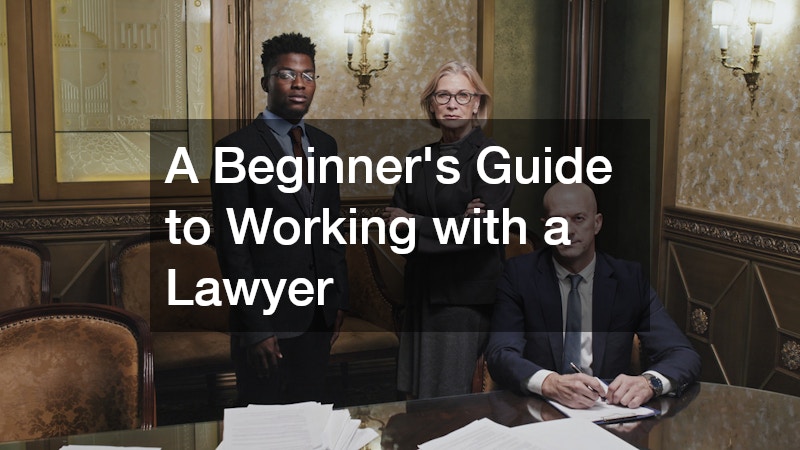Navigating the legal system for the first time can be daunting, whether you’re facing criminal charges, going through a divorce, or filing for bankruptcy. Having the right legal representation can make all the difference in achieving a favorable outcome. This beginner’s guide aims to demystify the process of working with a lawyer, helping you understand when to seek legal help, what types of lawyers are available, and how to choose the right professional for your specific situation.
Understand When You Need a Lawyer
The first step is recognizing when legal counsel is necessary. While some legal issues can be handled independently, many situations benefit from professional expertise, especially when your rights, freedom, or financial security are at stake. A good lawyer is not just a representative in court; they are also your guide through a complex system.
Common reasons to consult a lawyer include facing criminal charges or a DUI, beginning divorce proceedings, dealing with child custody or support issues, and filing for bankruptcy. If you’ve suffered injuries in an accident, drafting a will, or handling estate planning, you’ll also benefit from professional guidance. Each of these scenarios can have significant ramifications, which is why expert advice is invaluable.
If you’re unsure whether you need a lawyer, a brief consultation with a legal professional can help you decide. This initial step not only gives you direction but ensures that your interests are protected from the outset. Knowing when to seek help is a key part of avoiding legal pitfalls.
Know the Types of Lawyers and Their Specialties

The legal field is broad, and many attorneys specialize in specific areas of law. Understanding the distinctions between different types of lawyers will help you find the best fit for your needs. Not all lawyers are suited for every case, so matching the expertise to your situation is crucial.
DUI attorneys specialize in defending clients against impaired driving charges. They know how to challenge breathalyzer results, arrest procedures, and other critical aspects of DUI cases. With their specific expertise, DUI attorneys can often negotiate reduced penalties or alternative resolutions.
Family law attorneys handle issues impacting families, including divorce, child custody, adoption, and alimony. These cases are often emotionally charged, requiring a compassionate yet firm approach. An experienced family law attorney can guide you through these delicate processes, minimizing conflict and achieving equitable resolutions.
DUI Attorney
If you’ve been arrested for driving under the influence, a DUI attorney is essential. These professionals have acute knowledge of DUI laws and defense strategies. They are skilled at navigating the complexities of your case, from challenging field sobriety tests to advocating for reduced charges.
Hiring a DUI attorney ensures that your rights are protected throughout the legal process. They work to uncover issues with arrest procedures or evidence collection that could benefit your case. Ultimately, their goal is to minimize the consequences and restore your standing as quickly as possible.
The support of a DUI attorney can alleviate much of the stress associated with these charges. By focusing on building a strong defense, they enable you to face the future with greater assurance. Don’t underestimate the value of having a seasoned professional on your side.
Family Law Attorney
A family law attorney handles legal issues that impact families, including divorce, child custody, adoption, and alimony. Family law is emotional and complex, so having an experienced attorney can make the process smoother and less stressful. The right family law attorney understands the nuances of family dynamics and legal statutes alike.
These attorneys offer essential guidance during difficult transitions, such as divorce or custodial disputes. They focus on protecting your interests while advocating for fair and just outcomes. With their expertise, you can navigate these challenging circumstances more effectively.
Choosing a skilled family law attorney provides peace of mind during tumultuous times. By ensuring that your case is handled with sensitivity and skill, they contribute to healthier family resolutions. Trusting a legal professional with such important matters is vital for long-term harmony.
Bankruptcy Lawyers
When you’re overwhelmed by debt and considering filing for bankruptcy, bankruptcy lawyers are your go-to experts. They can advise you on the best chapter to file, such as Chapter 7 or 13, and guide you through the necessary paperwork. Bankruptcy lawyers represent you in court proceedings, ensuring that your rights are upheld throughout the process.
The decision to pursue bankruptcy is momentous and fraught with emotion and complexity. Bankruptcy lawyers offer not only legal solutions but also comfort and clarity in an often-confusing legal matter. Their expertise means you receive informed advice on the implications of bankruptcy for your financial future.
With a qualified bankruptcy lawyer by your side, you can rest assured that your case is managed carefully and professionally. Their comprehensive understanding of bankruptcy laws can lead to more favorable outcomes and a clearer path to financial recovery.
Injury Attorney
If you’ve been injured due to someone else’s negligence—such as in a car accident or a slip and fall—an injury attorney can help you seek compensation for medical bills, lost wages, and pain and suffering. The role of an injury attorney is to advocate for their clients’ rights and ensure they receive the compensation they deserve. Each injury case requires thorough investigation and keen legal strategies.
An injury attorney will handle all negotiations with opposing parties and insurance companies. Their focus is on building a strong case that reflects the full extent of your injuries and the impact on your life. With their expertise, you are more likely to achieve a fair settlement.
This kind of advocacy is essential for those coping with the aftermath of an injury. By allowing the injury attorney to manage the legal complexities, you can concentrate on healing and rebuilding your life. Trust in their guidance can lead to a more secure future.
Criminal Attorney
A criminal attorney defends individuals charged with crimes ranging from misdemeanors to felonies. They work tirelessly to protect your rights and build a defense that can lead to reduced charges, plea deals, or case dismissals. With their deep understanding of criminal law, these attorneys offer high-level guidance and representation.
Criminal attorneys are skilled in scrutinizing evidence and challenging the validity of the prosecution’s case. Their goal is always to seek the most advantageous outcome for their clients, safeguarding their freedom and future opportunities. Their practice requires sharp acumen and dedication.
The process of being charged with a criminal offense can be overwhelming. A criminal attorney provides not only legal representation but a strategic approach tailored to your needs. With their aid, you gain a formidable ally in the legal system.
Criminal Defense Lawyers
Often used interchangeably with criminal attorneys, criminal defense lawyers specifically focus on defending clients against criminal prosecution. Their role includes examining evidence, negotiating with prosecutors, and representing clients in court. They hold a critical position as protectors of due process and individual rights.
Criminal defense lawyers are adept at recognizing weaknesses in the prosecution’s case and using them to their client’s advantage. They are seasoned negotiators capable of securing favorable deals. Their comprehensive preparations underpin the strength of their defense strategy.
For anyone facing criminal charges, the right legal partner acts as a pillar of support. With criminal defense lawyers in your corner, you gain not only a defender but someone committed to justice and fairness. Their keen expertise can make a decisive impact on your case’s outcome.
Local Injury Lawyers
If you want personalized attention and quick response times, local injury lawyers are often a better choice than large firms. They are more accessible and have a better understanding of local laws and court procedures. With a local injury lawyer, you receive tailored legal counsel that reflects community standards and expectations.
These dedicated professionals are well-versed in the nuances of personal injury law relevant to the community in which they operate. Their ability to respond swiftly to developments in your situation ensures that you are always informed and involved. Their local knowledge can provide critical advantages in your case.
Engaging a local injury lawyer means benefiting from their relationships and reputation in the local legal community. By fostering a close attorney-client relationship, they offer more than representation—they offer genuine support and advocacy. The results are often more satisfying and beneficial for their clients.
Divorce Lawyer
A divorce lawyer helps clients navigate the end of a marriage. Their services include property division, spousal support negotiations, and custody arrangements. With these sensitive matters at play, a divorce lawyer balances empathy with professionalism.
These experts can negotiate settlements that protect a client’s well-being and finances during a transition. By engaging with a divorce lawyer, clients benefit from strategies that mitigate conflict and reduce stress. Their informed perspective empowers those undergoing these significant life changes.
Long-term resolutions are more achievable with professional guidance. Having a divorce lawyer means accessing expert negotiation skills and procedural knowledge necessary for a smoother separation process. The result is greater peace of mind and the chance for a better future following a marriage dissolution.
Family Attorney
Similar to a family law attorney, a family attorney can offer broader support for various domestic matters, including prenuptial agreements, guardianship, and domestic violence issues. Their comprehensive understanding of family law ensures all aspects of a domestic situation are addressed with care.
Family attorneys provide trusted counsel across a range of issues, offering reassurance and strategic advice at critical times. By dealing with diverse family-related legal needs, they establish longstanding relationships with clients built on trust and respect.
With a family attorney, you have an advocate who knows the legal intricacies of your circumstances. Their familiarity with statutory and procedural laws means that you’re guided effectively through legal corridors. Their broad scope of practice makes them invaluable partners in managing family law cases.
Bankruptcy Attorneys
While the term is interchangeable with bankruptcy lawyers, bankruptcy attorneys often have experience in both personal and business bankruptcy. They can represent individuals, couples, or companies in complex debt relief cases. Their expertise in bankruptcy law serves as a vital asset for those in financial distress.
Bankruptcy attorneys evaluate your financial situation, propose solutions, and represent your interests in negotiations and court proceedings. Their detailed understanding of bankruptcy codes and laws allows you to navigate the process with more confidence and less stress.
Choosing a bankruptcy attorney means having a professional who thoroughly examines your case to offer the most strategic options for debt relief. They act as a bridge to financial recovery, ensuring that your rights are not infringed upon during the bankruptcy proceedings. Their commitment to your case highlights the importance of legal support when finances are at stake.
How to Find the Right Lawyer

Once you know what type of lawyer you need, the next step is finding one who’s qualified and a good fit for your case. Begin the search by exploring online directories, state bar associations, or legal matching services. Looking for a lawyer with specific experience and credentials in your legal issue ensures that you get the best support possible.
Asking for referrals from friends, family members, or coworkers who have faced similar legal challenges can offer reliable leads. Word of mouth remains one of the most trustworthy sources of feedback regarding a lawyer’s capabilities and client service. Personal recommendations can provide insight that is invaluable when making your decision.
Always check a lawyer’s credentials to confirm they are licensed to practice in your state and have no disciplinary actions on their record. Many state bar associations provide online lookup tools for this purpose. Conducting due diligence at this stage prevents future complications and ensures your chosen lawyer is above reproach.
Know What to Expect During Your First Meeting
When meeting with a lawyer for the first time, preparation is key. Bring any relevant documents and be ready to explain your situation in detail. Use this initial consultation to gauge whether the attorney understands your case and communicates clearly and effectively.
The lawyer will likely review your case details, explain your legal options, outline potential outcomes, and discuss their fees and payment structures. This is an opportunity to learn more about the lawyer’s approach to handling your specific issue. Engaging in this open dialogue helps you determine their suitability as your legal representative.
This meeting is your chance to ask questions and assess whether this lawyer is the right match for you. Observing their responsiveness and demeanor can give you a sense of whether they’re the right professional to handle your case. A successful first meeting builds the foundation for a productive attorney-client relationship.
Understand How Legal Fees Work

Different lawyers use different billing models, including hourly rates, flat fees, contingency fees, and retainers. Understanding these options ahead of time prevents future misunderstandings regarding legal costs. Discussing fees candidly with your lawyer is crucial for setting clear financial expectations.
Hourly rates are common for family attorneys, divorce lawyers, and criminal attorneys, where clients are billed for time spent working on their case. Flat fees are used for straightforward services like drafting wills or uncontested divorces. Contingency fees, often employed by injury attorneys, mean the lawyer is paid only if the client wins, usually as a percentage of the settlement.
Retainers involve an upfront fee for securing a lawyer’s services, often used in complex or long-term cases. Regardless of the billing model, always ask for a written fee agreement. This document provides a clear structure for financial obligations and fosters transparency between you and your lawyer.
Work Effectively with Your Lawyer
To get the most from your attorney-client relationship, follow best practices such as being honest, staying organized, responding promptly, asking questions, and respecting their time. These strategies ensure your case progresses smoothly and that both parties remain on the same page. Clear communication and accordance are key to effective collaboration.
Always tell the truth, even if it’s uncomfortable, as your lawyer needs all the facts to defend or represent you effectively. Open communication builds trust and allows your lawyer to craft a strategy that fully addresses your legal situation. Deception, even if unintentional, can undermine the success of your case.
Stay organized by keeping copies of all relevant documents and communications. This not only helps your lawyer stay up to date but also saves time amid proceedings. Being proactive with information and deadlines demonstrates professionalism and seriousness about your case.
Know Your Rights as a Client

You have legal rights when working with a lawyer, including confidentiality, competence, communication, and respect. These rights ensure that you’re treated fairly and ethically throughout the legal process. Knowing your rights empowers you to participate actively and assertively as a client.
Confidentiality means that your conversations are protected by attorney-client privilege, allowing you to speak freely without fear of exposure. Competence mandates that your lawyer provide skilled representation, aligning with professional standards. Communication means you are entitled to updates on your case and to access your lawyer when necessary.
If these standards are not met, you can file a complaint with your state’s bar association. This professional oversight safeguards your interests and maintains the integrity of the legal profession. Your rights are foundational to ensuring you receive the caliber of service your case deserves.
Frequently Asked Questions
What’s the difference between a criminal attorney and a criminal defense lawyer?
They are largely the same. Both defend clients accused of crimes. “Criminal defense lawyer” emphasizes the role of defending against prosecution. Having a lawyer skilled in these distinctions ensures a focused and effective defense strategy.
Do I need a DUI attorney if it’s my first offense?
Yes. Even a first-time DUI can have serious consequences like fines, license suspension, or jail time. A skilled DUI attorney can help reduce or dismiss charges, ensuring you navigate the legal waters with minimal impact to your life.
Can a family law attorney help with domestic violence cases?
Absolutely. Many family law attorneys are experienced in handling protection orders, custody adjustments, and other legal measures related to domestic abuse. Their familiarity with sensitive family dynamics enhances their ability to offer effective protection and guidance.
Legal Help You Can Trust
Whether you’re facing a criminal charge, a financial crisis, or family conflict, the right legal support can make a world of difference. From a knowledgeable DUI attorney to compassionate family law attorneys, from experienced bankruptcy lawyers to aggressive criminal defense lawyers, there is a legal professional suited to your needs. Each specialty brings unique skills and focus that aim to protect your future.
Don’t wait until a situation escalates. If you’re unsure where to start, consult a local injury lawyer, family attorney, or divorce lawyer to assess your options. Investing in legal guidance today can protect your future tomorrow. When you have trustworthy legal experts guiding you, the complexities of your legal battles become more manageable.

